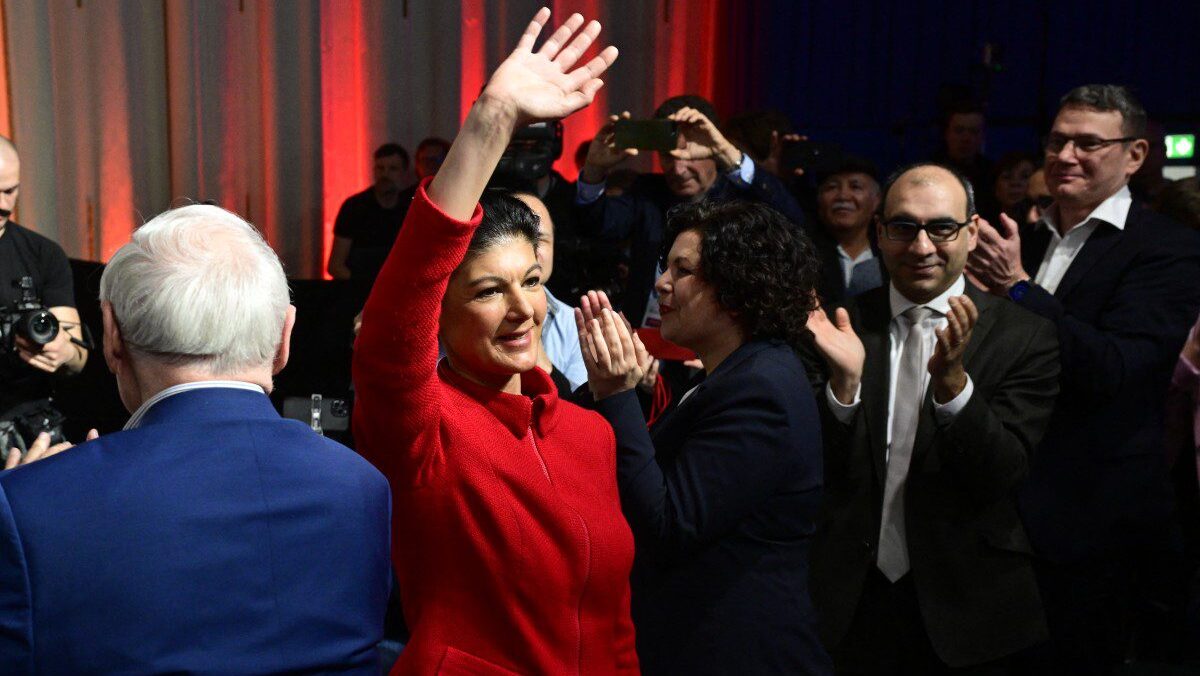
Sahra Wagenknecht, Leader of the new left-wing party Alliance Sahra Wagenknecht (BSW), receives applause from party members after her speech, during their first congress, in Berlin on January 27, 2024
Photo: John MACDOUGALL / AFP
Less than a year after splitting from a moribund Die Linke party and only a month after founding her own “left-wing conservative” alternative, Sahra Wagenknecht is apparently laying the foundations for a new anti-NATO alliance within the European Parliament, in a move that is unnerving many on the establishment left in Brussels.
With Wagenknecht’s BSW party projected to become the largest socialist delegation within the European Parliament later this year with seven seats, the German firebrand indicated her intention to potentially form a new explicitly anti-NATO grouping away from the pre-existing Left faction, a move that could potentially torpedo the influence of established leftist delegations
Wagenknecht’s brand of anti-woke socialism could further unsettle the European Left group in Brussels already grappling with splits, personality clashes, Ukraine and what to do about a working-class voter base increasingly receptive to right-wing populism as it stumbles into June’s European elections.
Without mentioning specifics, Wagenknecht confirmed that “talks and considerations are indeed taking place” with potential allies across Europe. Tactically, the German politician has not ruled out joining the current parliamentary Left faction—becoming the effective kingmaker within—and could simply be using the threat of a new group as leverage.
A veteran socialist MP and noted critic of mass migration and “woke metropolitan hipsterism,” Wagenknecht sent shockwaves through the German political establishment last month with the establishment of her Bündnis Sahra Wagenknecht (BSW) political party on a stridently left-populist platform.
Alongside the rapid rise of the right-wing populist AfD, BSW’s political debut adds to the current populist Zeitgeist in Germany. A month after their launch. Wagenknecht and her new party already have polling numbers of approximately 8% nationwide, with support concentrated in the former DDR region as well as ten MPs in the Bundestag, with the left-wing populists now setting their eye on June’s European elections and prospective European partners.
Ideological groups within the European Parliament confer status and funding to national political parties. To form a new parliamentary group within the chamber, Wagenknecht would need 23 MEPs from seven EU countries. To date, the Danish socialists have denied receiving overtures from the German left-populists.
Should she pursue forging a new faction within the Parliament, Wagenknecht is likely to find allies with many post-communist socialist parties, including Slovakia’s ruling Smer party, recently suspended from the centre left S&D group for its anti-NATO and socially conservative stances. Wagenknecht’s representatives have also confirmed prospective talks with France’s La France Insoumise.
The smallest group within the European Parliament with 41 MEPs, The Left is judged to be a declining force within the chamber, undermined by splits over the Ukrainian war and a rising current of Islamic-populism in some Western European parties. It would be further weakened by the expected departure of the Greek Syriza party under a more reformist leadership.
The faction’s woes were heightened by a recent power struggle within the French delegation over who would be the lead candidate for the elections, with one French socialist lamenting that the group was focusing more on office politics than combating the far right or capitalism.
